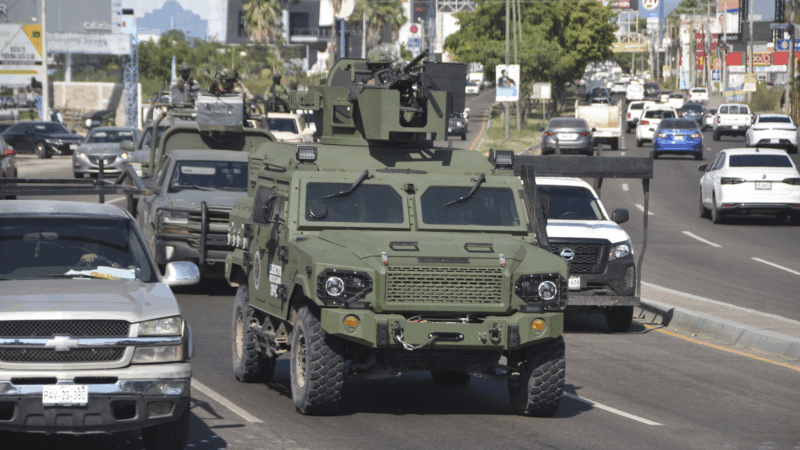Cartel violence in Sinaloa, Mexico, leaves 20 dead, including 4 decapitated bodies
MEXICO CITY — Four decapitated bodies were found hanging from a bridge in the capital of western Mexico’s Sinaloa state on Monday, part of a surge of cartel violence that killed 20 people in less than a day, authorities said.
A bloody war for control between two factions of the powerful Sinaloa Cartel has turned the city of Culiacan into an epicenter of cartel violence since the conflict exploded last year between the two groups: Los Chapitos and La Mayiza.
Dead bodies appear scattered across Culiacán on a daily basis, homes are riddled with bullets, businesses shutter and schools regularly close down during waves of violence. Masked young men on motorcycles watch over the main avenues of the city.
On Monday, Sinaloa state prosecutors said that four bodies were found dangling from the freeway bridge leading out of the city, their heads in a nearby plastic bag.
On the same highway Monday, officials said they found 16 more male victims with gunshot wounds, packed into a white van, one of whom was decapitated. Authorities said the bodies were left with a note, apparently from one of the cartel factions, though the note’s contents were not immediately disclosed.
Feliciano Castro, Sinaloa government spokesperson, condemned the violent killings on Monday and said authorities needed to examine their strategy for tackling organized crime with the “magnitude” of the violence seen.
“Military and police forces are working together to reestablish total peace in Sinaloa,” Castro said.
Most in the western Mexico state, however, say authorities have lost control of the violence levels.
A bloody power struggle erupted in September last year between two rival factions, pushing the city to a standstill.
The war for territorial control was triggered by the dramatic kidnapping of the leader of one of the groups by a son of notorious capo Joaquín “El Chapo” Guzmán who then delivered him to U.S. authorities via a private plane.
Since then, intense fighting between the heavily armed factions has become the new normal for civilians in Culiacan, a city which for years avoided the worst of Mexico’s violence in large part because the Sinaloa Cartel maintained such complete control.
In southeast Mexico on Monday, a priest was shot leaving his home in Villahermosa, Tabasco. The Tabasco Diocese said in a statement that Rev. Héctor Alejandro Pérez had been on his way to visit someone who was ill when he was shot. The diocese said Pérez lost a lot of blood and had internal injuries putting him in “very serious” condition.
U.S.-Israeli strikes in Iran continue into 2nd day, as the region faces turmoil
Israel said on Sunday it had launched more attacks on Iran, while the Iranian government continued strikes on Israel and on U.S. targets in Gulf states, Iraq and Jordan.
Trump warns Iran not to retaliate after Ayatollah Ali Khamenei is killed
The Iranian government has announced 40 days of mourning. The country's supreme leader was killed following an attack launched by the U.S. and Israel on Saturday against Iran.
Iran fires missiles at Israel and Gulf states after U.S.-Israeli strike kills Khamenei
Iran fired missiles at targets in Israel and Gulf Arab states Sunday after vowing massive retaliation for the killing of Supreme Leader Ayatollah Ali Khamenei by the United States and Israel.
House Dem. Leader Jeffries responds to air strikes on Iran by U.S. and Israel
NPR's Emily Kwong speaks to House Minority Leader Hakeem Jeffries (D-NY), who is still calling for a vote on a war powers resolution following a wave of U.S.- and Israel-led airstrikes on Iran.
Iran’s Ayatollah Ali Khamenei is killed in Israeli strike, ending 36-year iron rule
Khamenei, the Islamic Republic's second supreme leader, has been killed. He had held power since 1989, guiding Iran through difficult times — and overseeing the violent suppression of dissent.
Found: The 19th century silent film that first captured a robot attack
A newly rediscovered 1897 short by famed French filmmaker Georges Méliès is being hailed as the first-ever depiction of a robot in cinema.






